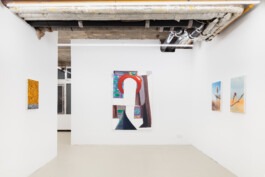
Maximilian Arnold & John Kleckner – Sidesteps: Roughly Edged
Jul 24 – Aug 28, 2021
Opening: Friday, Jul 23, 6 – 10 pm
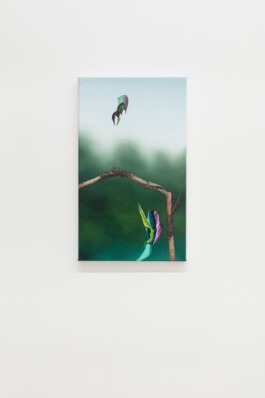
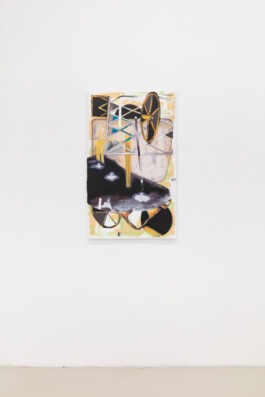
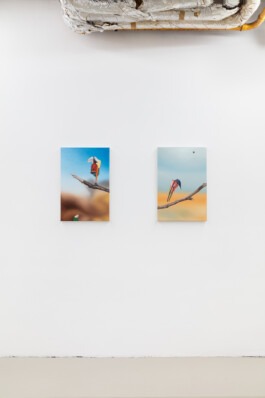
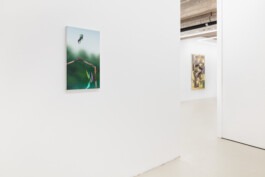
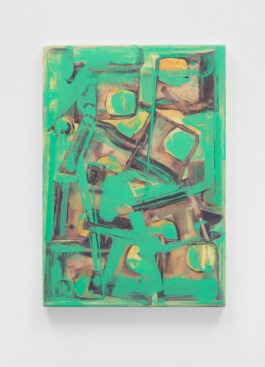
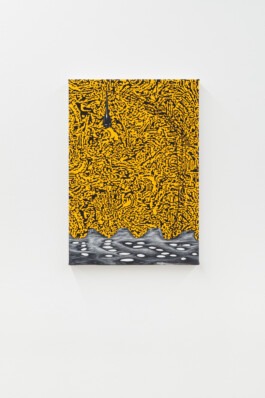
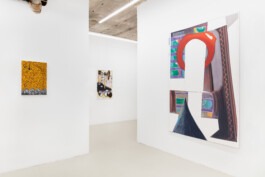
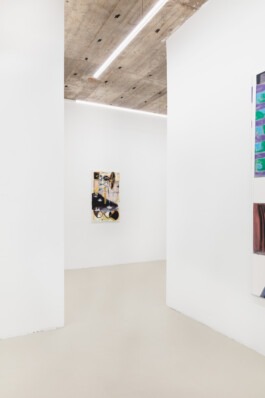
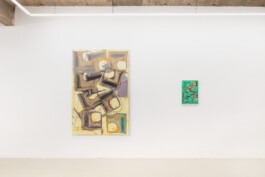
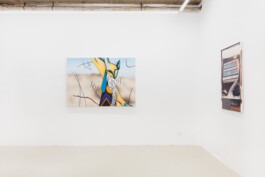
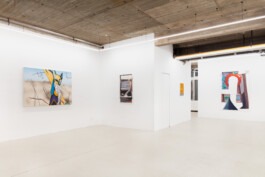
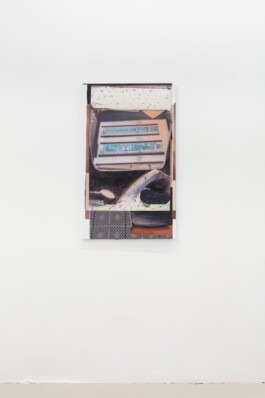

All photos by Stefan Hähnel
We cordially welcome you to an exhibition of recent paintings by Maximilian Arnold & John Kleckner. This is the first time these Berlin-based artists have displayed their artworks together. Arnold & Kleckner work independently from each other, but through conversations they discovered they shared many formal and conceptual ideas about painting. In this way, selecting pictures for the exhibition became a visual conversation; one canvas making and defining a statement, while the next one reflects, responds, or even refutes it. The topics and themes of this conversation range across formal issues of color, texture, and shape, to more pertinent concerns about the (im)precision of memory, illusionism of surfaces, (dis)locations, interior/exterior, and the joy of ambiguity and not knowing. — Take a look.
The joy of not knowing, delighting in uncertainty, is a characteristic—perhaps even a philosophy of being— that both artists embrace. Ambiguity is an engine for discovery, it opens space for new possibilities of understanding. With ambiguity, certainty and fact have the ability to shift and slide, sidestepping the known, the nameable, and contradicting the obvious. When making their paintings, both artists cultivate a multiplicity of meanings. They use the suggestive power of pictures, to be precise without explicitly defining or naming things. Their paintings again sidestep categorical labels, boundaries between figuration and abstraction are blurred, rough edges become aesthetic discoveries. These are complicated pictures, fixed on the canvas yet seemingly in motion. These are works that unfold in front of your gaze while remaining exactly the same. — Look again.
Collage and juxtaposition are essential to both artists’ practices as a foundational principle and a technical strategy. Prior to putting any paint on the canvas, much time is spent selecting, cropping, and distorting visual fragments of both digital photographs and found printed materials. Often, the more visual information that is stripped and removed, the more potent and useful the fragments become. In Arnold’s works, fragments are layered and stacked, the space of the composition is delineated with edges, not by perspective points. The results read like densely-filled interiors, shapes pressing the foreground, almost claustrophobic. Kleckner’s works, by contrast, are all exterior scenes; high-chroma fragments floating in an unsharp landscape. The claustrophobic density is replaced here with the anxiety of agoraphobia— feeling lost in too much open space, focus on something close at hand, like a branch, and hold on. Yet even with all the tense and anxious psychological energy in these paintings, there is also an inquisitive playfulness; think of the rhyming and repetition of shapes in Arnolds canvases or Kleckner’s vibrant animal-like fragments. These works provoke a feeling like a frantic realization of being hopelessly lost in a forest, but still taking time to notice the color of leaves and enjoy the shade trees. These artists invite viewers to pay attention to details small and overlooked, to examine edges, textures, and specific colors. After all, it’s details that reveal so much crucial information we need to know, and everything is a detail of something larger. — Look again, again!
Maximilian Arnold was born 1987 in Heidelberg, Germany. From 2009-2013 he studied at Staatliche Akademie der Bildenden Künste in Karlsruhe with Prof. Toon Verhoef before he graduated in 2015 at Städelschule Frankfurt am Main after two years with Prof. Willem de Rooij. He lives and works in Berlin. Recent solo shows include: „Prepost“, Palazzo Monti, Brescia (IT), 2020; „No Place To Rest“, Tobias Naehring, Leipzig (D), 2019 and „A Deep Scrub“, DUVE Berlin, Berlin (D), 2017. Selected group shows include: „Fictional Nature“, Bärenzwinger, Berlin (D), 2019; „Group Show“, Galerie Onrust, Amsterdam (N), 2019; „Your North Is My South“, Museum für Neue Kunst Freiburg, Freiburg (D), 2018; „Shades Of Grey“, Kunstraum Riehen, Riehen (CH), 2016; „Encoding The Urban“, Kunsthaus Baselland; Muttenz (CH), 2016 and „Parked Like Serious Oysters“, Museum für Moderne Kunst Frankfurt am Main, Frankfurt am Main (D), 2015.
John Kleckner was born in Iowa, USA. He has lived and worked in Berlin since 2007. He graduated with a BFA from the University of Iowa. He is currently an instructor of painting & drawing at Bard College Berlin. This year he was awarded a Pollock-Krasner Artist Grant. His paintings are currently on view in the group exhibition, Return of the Dragons: Chinatown LA 1998-2008 at Blossom Market in Los Angeles. Recent solo exhibitions include, Desert Rumors at Francesco Pantaleone Arte Contemporanea, Milan in 2019; Years Disappear at Galerie Judin, Berlin in 2017. His works are in the collections of Museum of Modern Art (MoMA), New York; Magasin III Museum & Foundation for Contemporary Art, Stockholm; Saatchi Gallery, London.